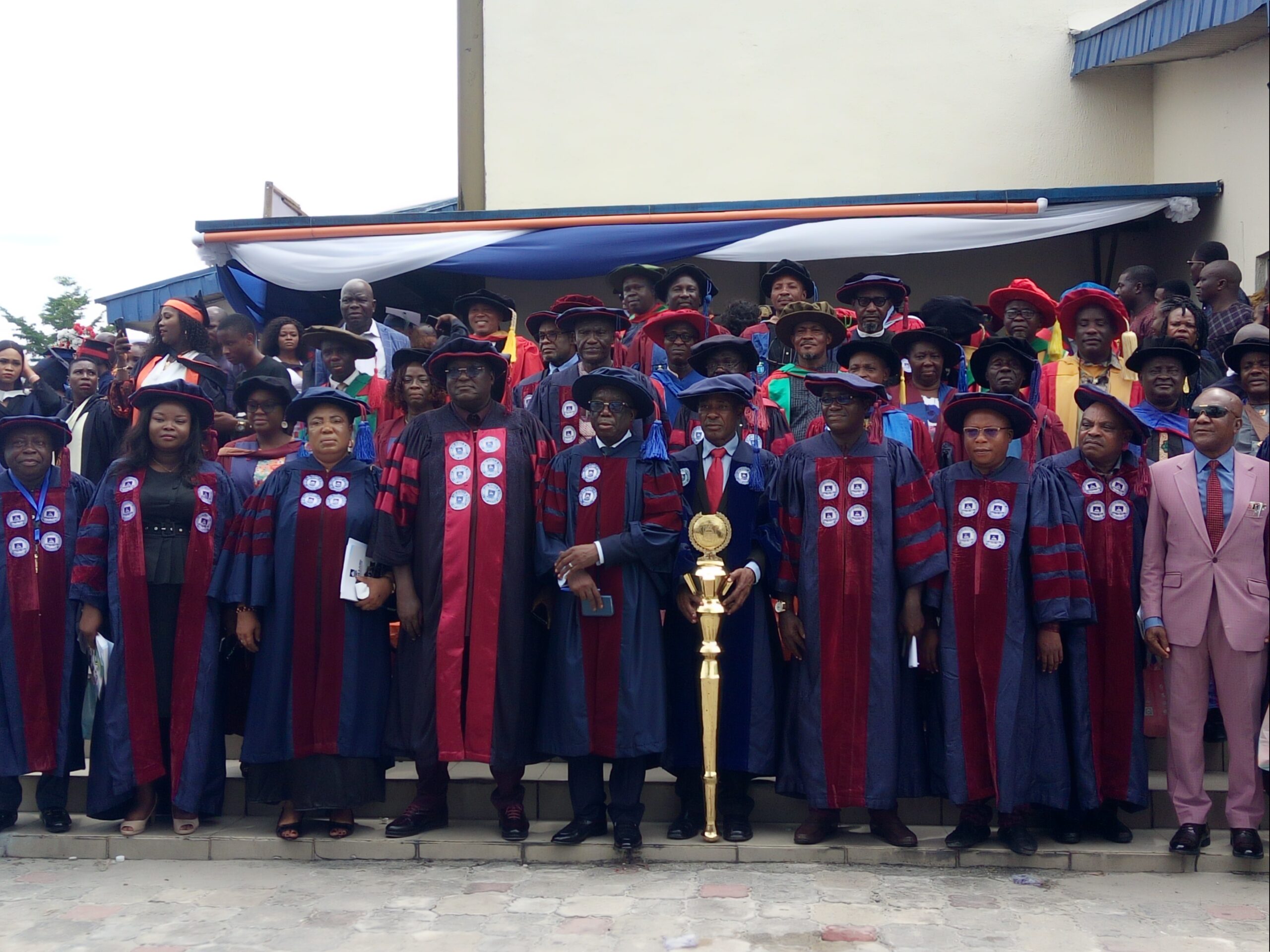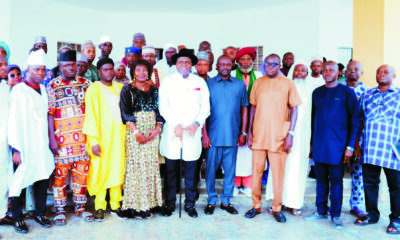Education
Students’ Loan Bill Before Senate, Says Board
The Director, Federal Scholarship Board, Mrs Fatima Ahmad, says the students loan bill before the Senate seeks to provide access to education for the Nigerian students.
Ahmad said this in an interview with the Newsmen in Abuja on Monday.
The National Assembly is seeking to re-establish a student’s loans board targeted at Nigerian students in higher institutions.
There are separate bills on students’ loan and scholarship before the Senate and House of Representatives respectively, aimed at increasing access into higher education without financial hindrances.
The director was of the opinion that both bills before the Senate and House of Representatives if harmonised would help assist students, who ordinarily cannot afford to go to school.
According to her, I am of the opinion that the bill, which focuses on excellence will strengthen scholarship in Nigeria.
“The bill before the senate I think if put together with that of the one in the house of reps, will help the children access education at low interest rates.
“ I think the essence of both bills is to increase access, especially for people who cannot afford to go to school.
“I don’t see the bills as two bills, I believe the two bills will be looked at critically and become a common bill that the house will present to the executive.
“The national assembly should be able to say more about this; our position at the board is to wait for the outcome of national assembly’s deliberations on the bills.’’
Ahmad added that a committee had been set up in the board to look at the two bills and come up with detail recommendations that would be sent to the Ministry of Education for onward deliberation.
She said that the major problem that affected the previous students’ loan board was insincerity on the part of some students, who took loans and refused to pay back.
Ahmad said that with the recent introduction of the Bank Verification Number (BVN), the re-establishment of the students’ loan would be effective.
He said that it would now be easy to trace these students with the BVN and compelled them to pay back their loans.
On the issue of non-remittance of students’ scholarship, especially students studying in Cuba, she said the economic disagreement between Cuba and the United State of America had prevented the payment.
She, however, said that the Federal Government was working on it to ensure full payment of scholarship to Nigerian students in Cuba.
“We have bilateral agreement with about 11 countries and Cuba is one of them. Cuba has a sort of disagreement with US.
“We have this money in dollars and the US did not allow financial transactions with Cuba.
“So when we paid every other child in November 2017 their own went and was later returned.
Education
Former VC Advocates Drug Test For University Lecturers

Prof. Muhammad AbdulAziz, the immediate past Vice Chancellor of Abubakar Tafawa Balewa University (ATBU), Bauchi state, has advocated drug tests for lecturers to sanitise the university system.
Mr AbdulAziz stated this in a valedictory speech to the Senate of the University at a handing-over ceremony to his successor, Prof. Sani Kunya, the new acting Vice Chancellor of the institution.
While commending the decision by the Federal Ministry of Education to introduce drug tests for students seeking admission to all universities, he said such tests should be extended to lecturers.
According to him, it would further sanitise the university system and promote sanctity and academic excellence.
“We have discussed with the Federal Ministry of Education and they want to introduce to all universities that before any student would be registered in the universities, he or she must undergo drug tests.
“If students should undergo drug tests, I believe that even some of us, the lecturers, need to undergo the same test so that we know our status.
“We also have to volunteer ourselves to have this test done on us because we have to sanitise the university.
“If the students are to be subjected to drug tests to determine their mental health status, nothing is wrong if the lecturers too are subjected to the same test.
That is the only way to check excesses in the university system,” he said.
Mr AbdulAziz said the modest achievements recorded during his tenure were in the areas of infrastructural development, academic content development and community services.
He said the achievements recorded could not have been made possible without the support of all stakeholders in the system.
He appreciated the federal government for the support rendered to the University through the Federal Ministry of Education and its various agencies like the National Universities Commission and the Tertiary Education Trust Fund.
Read Also:Students to undertake drug test before admission UniAbuja
Also speaking, the new acting VC of the university expressed gratitude to the Senate for finding him worthy of the honour and to the federal government for his confirmation.
“I want to assure you that I will justify the confidence reposed in me by not disappointing you all.
Education
Don Seeks 20%Increased Budget Allocation To Education

A Professor of Economics in the Faculty of Social Sciences University of Port Harcourt, Rivers State, Prof Willie J. Okowa has called on government at all levels to increase her Education sectorial budgetary allocation to twenty percent of their annual budget , saying that such efforts will improve the development of education in the country.
Okowa said each government wether local, state or federal governments should devote an increased proportion of her annual budget to education such that in the next five to ten years , so that we can see at least 20 percent of her budget to the education sector.
He made this call while presenting the 42nd convocation lectures at the just concluded Iaue convocation ceremonies held at the university auditorium in port harcourt, recently.
He posisted that the economy has a nexus with sustainable higher education to the effect that a robust economy plays a key role in the sustainability of higher .education , while a sustainable higher education plays a supportive economic growth and development
“On the hand,a failing economy can hardly support a sustainable higher education”.
According to him ,a growing economy easily provides the finances to fund sustainable higher education while a education provides the relevant skills and the manpower needs required to propel economic growth and development,”of course, The Inadequate provision of higher educational facilities will fail to the manpower needs required by the economy to support its growth and development”
“The ability of an economy to adquately find higher education also depends on the rate of the population ,the higher the rate of growth of population, the more the number of the people that require higher education .Hence ,a rapid population growth puts more pressure on the ability of the economy to adquately fund higher education, irrespective of its performance.”
“Population growth , economic growth and the adequate funding of higher education are therefore intricately interlinked.The adequacy of the funds that an economy provides to finance higher education also depends on how well the managers of our education institutions manage such funds.
If people who lack character , integrity and merit are appointed to helms of affairs institutions,then funds can hardly be adequate .on the other hands ,if people of character, integrity and merit are given such appointments ,then the outcome will be much better” he stated.
The erudite scholar opined that Nigerian universities and colleges are also passing through strange times and outlined outdated laboratories , inadequate classrooms, adding that many students involved in drugs and prostitution.
By: Akujobi Amadi
Education
Bauchi Govt Threatens To Revoke Scholarship Of Unserious Students

The Bauchi State government has cautioned that it will cease payment of external exam fees for Senior Secondary Three, SS3 students found skipping classes.
Commissioner for Education, Jamila Dahiru gave the warning in Bauchi during her school resumption inspection and monitoring visits to some schools on Wednesday.
The Tide’s source recalls that Governor Bala Mohammed earlier allocated N396.9 million for the 2023/2024 external exams of 14,170 students in public schools.
The external examinations paid for included the West African Examination Council, WAEC, the National Examination Council l, NECO, National Board for Arabic and Islamic Studies (NBAIS) and the Joint Admissions and Matriculation Board, JAMB.
However, the Commissioner, who was furious with the low level of attendance of especially the SS3 students in some schools, recounted how she met less than 20 percent of the SS3 students who were around when she visited a particular school.
She stressed the need for students to return to class and prepare diligently, threatening to revoke scholarships for ‘unserious ones.’
Her words: “We just realised that most of these students, after being taught from JSS1 to SS3 and with Gov. Bala Mohammed paying for their external exams, and as soon as they were done with their mock exams, they left school and won’t return until the first day of their external exams.
“It is sad to acknowledge that we are not responsible as parents because I want to believe that they have parents who are seeing them attending schools simply because they are getting ready to just write their external examinations.
“We want to make them come back to class, we want to emphasize that we are investing in the right people because it is just telling us that it is the government that bothers about their education while they don’t care and probably their parents that are allowing them to stay at home also do not care.
-
Business3 days ago
Boat Mishap: CILT Advocates Safety Culture On Waterways …Claims 300 Nigerians In 2023
-

 Niger Delta3 days ago
Niger Delta3 days agoNCDMB Boss Lauds SNEPCO, Others Over Project Execution
-

 Business3 days ago
Business3 days agoAFEX Launches Impact Report On Food Security
-
Oil & Energy3 days ago
FG Explains Sulphur Content Review In Diesel Production
-

 News3 days ago
News3 days agoNGF Advocates Safer Transportation Of Petroleum Products
-

 Maritime3 days ago
Maritime3 days agoDrydock To Complete LAGFERRY Maintenance, Aug -Commissioner
-
Business3 days ago
LASG Makes Over N500m From Traffic Offences
-

 Education3 days ago
Education3 days agoVC Demands Improved Power Supply For University

